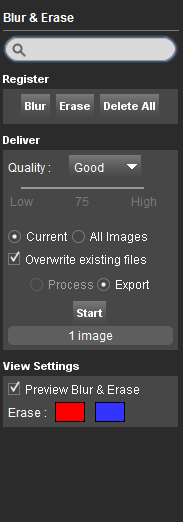Blur and Erase
This page describes how use the extension “Blur & Erase” in the Orbit desktop.
As the name says, “Blur & Erase” extension makes it possible to blur or to erase parts of the imagery, in order to hide unwanted elements. It can be used to hide car plate numbers or people faces.
![]() Main Toolbar > Extensions > Blur & Erase
Main Toolbar > Extensions > Blur & Erase
Concepts
Blur
Make a part or several parts of an image indistinct, unclear and hazy by reducing the edge content and making the transition form one color to the other very smooth.
Erase
Delete a part or several parts of an image by changing the pixels in that area to a different color.
Files & folders
All created files are saved either in the same location as the input imagery or in a new folder called “ processed_blurred” inside the “panorama” folder of the respective run, depending on the chosen procedure, see bellow.
Sidebar

Search box
Search for a particular image or group of images to process, by using their name or a part of their name, inside the opened run folder structure. The result of the search will be highlighted on the Map. The first corresponding image found will be automatically opened in the MM View.
Register
Blur
Draw a polygon around the area to be blurred, directly on the MM Views.
Erase
Draw a polygon around the area to be erased, directly on the MM Views.
Delete All
Delete all drawn shapes.
Deliver
Quality
Set the compression quality for the processed images.
Select one of the preset values or use “Custom” to set any quality value via the slider below.
Higher quality will increase the file size and the corresponding time to load the image.
There is no point to process the images with a higher quality than the original image files. For most use cases jpg quality 80 “Good” will be ok.
More information about the effect of jpg quality and compression : https://en.wikipedia.org/wiki/JPEG.
Current
If flagged, only the current image will be processed.
All Images
If flagged, all images in the run folder will be processed, even if no polygons are present in some of them.
Overwritte existing files
If enabled, the original imagery will be overwritten. If not, an .xml file that contains the polygons coordinates will be added, and used as a mask instead of modifying the original imagery.
Process
If enabled, the resulting blurred imagery will be created in the same folder as the input imagery folder.
Export
If enabled, the new images will be saved in a new folder, called “ processed_blurred” inside the “panorama” folder of the respective run. When bluring/erasing images one by one ( Current ) , only this option is available.
View settings
Enable or disable changes preview. Choose the color for the blurring polygon and for the erased parts.